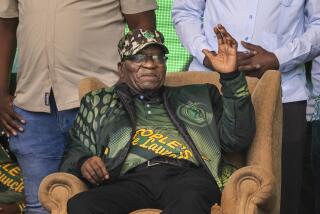South Africa’s ruling ANC party expels youth leader
Reporting from Johannesburg, South Africa —
The African National Congress expelled Julius Malema, the president of its youth wing, on Wednesday for sowing divisions and bringing disrepute to the South African ruling party.
The controversial Malema clashed with the leadership of the ANC and lost. His problems are not over: Multiple investigations of his alleged financial misdeeds are underway.
Wednesday’s decision is subject to appeal but, if upheld, would leave Malema little alternative but to start his own party. Other populist figures who have left in the party in the past have floundered in the face of the ANC’s political dominance.
Underscoring party tensions over the issue, the decision was announced hours later than expected. It was supposed to be made public late in the afternoon but was delayed until just before 10 p.m. Malema has two weeks to appeal, but the tide of support in the ANC appears to be turned against the populist firebrand.
Last year, Malema was suspended for five years for lack of discipline and bringing the party into disrepute after vowing to send a youth league team to engineer a change of government in Botswana,South Africa’sprosperous and democratic northern neighbor.
Malema appealed the suspension, but it was upheld by the disciplinary committee in early February.
His refusal to tone down his rhetoric in the weeks leading to Wednesday’s hearing backfired and prosecutors successfully argued for expulsion.
In his short career, Malema attracted more headlines than anyone else in South African politics, including President Jacob Zuma. The youth leader was viewed as a charismatic, provocative orator who used humor like a knife to slash his opponents.
His abrasive populism and pointed jibes at white South Africans made for volatile politics. He infuriated most whites but struck a chord with the alienated sea of unemployed black youths, many of whom can expect to never get a job.
He also took on the ANC’s sacred cows, attacking leaders who he said had failed South Africa, taunting government ministers and calling for nationalization of mines and banks, to the alarm of government ministers and foreign investors alike.
He went too far at times. He was convicted of hate speech after saying Zuma’s rape accuser at a 2006 trial “had a good time.” (Zuma was acquitted.)
In 2010, he embarrassed the ANC when he called a BBC journalist a spy and a “bloody agent.”
That same year, he was given a suspended sentence by the ANC disciplinary committee over his support forZimbabwe’sruling ZANU-PF party, seen as interference in South Africa’s foreign policy.
Malema grew up in a poor township in Limpopo province and, like Zuma, was the son of a domestic worker. As a teenager, Malema was drawn into the heady world of anti-apartheid politics. He failed woodwork at school but rose rapidly through the Congress of South African Students, an ANC-aligned body, and continued to move up through the ANC Youth League.
He threw his weight behind Zuma to help oust then-South African President Thabo Mbeki from the party leadership in 2007. Zuma’s allies later toppled Mbeki from the presidency.
As the youth league president, Malema fell out with Zuma in 2010, after the ANC disciplinary proceedings against him. Malema became a central figure in an ANC faction that is seeking to unseat Zuma at a party leadership conference this year.
Analysts say the ANC leadership struggle has paralyzed policy, as happened in 2007 when Zuma maneuvered against Mbeki.
Malema’s business dealings have come under scrutiny amid opposition engineered in the ruling party by Zuma’s allies.
Newspaper headlines asked how Malema was able to build a multimillion-dollar mansion in upscale Sandton on a lowly youth league official’s wage. And where did the multiple fancy cars and the trademark Breitling watch come from? Malema said they were gifts from friends, but his financial affairs are being probed by police, tax authorities and the South African public protector, an ombudsman figure.
Malema is the first ANC official to aggressively criticize the government over its failures to deliver basic services to the poor. With service delivery protests erupting regularly in townships and shantytowns around South Africa, many suggest it won’t be long before a new Malema-style figure emerges, with the same bombastic rhetoric and the same calls for nationalization of mines and banks.
More to Read
Sign up for Essential California
The most important California stories and recommendations in your inbox every morning.
You may occasionally receive promotional content from the Los Angeles Times.










